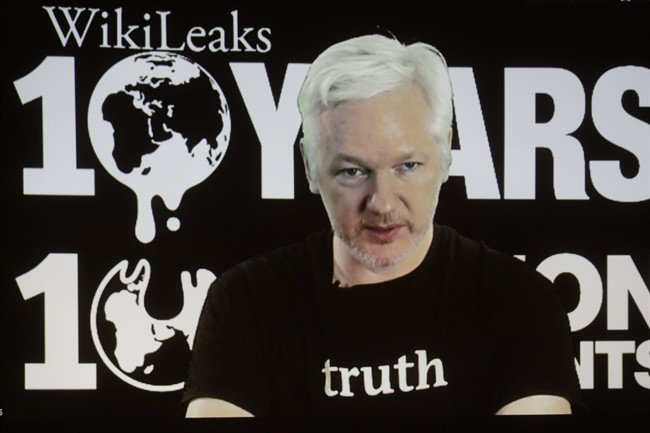PARIS – Midway through releasing a series of damaging disclosures about U.S. presidential contender Hillary Clinton, WikiLeaks founder Julian Assange said his hosts at the Ecuadorian Embassy in London abruptly cut him off from the internet. The news adds another layer of intrigue to an extraordinary campaign.

“We can confirm Ecuador cut off Assange’s internet access Saturday, 5pm GMT, shortly after publication of Clinton’s Goldman Sachs (speeches),” the group said in a message posted to Twitter late Monday.
READ MORE: WikiLeaks claims internet access for Julian Assange ‘severed’ by state actor
With both WikiLeaks and Ecuadorian officials refusing to say much more about the incident, outsiders were left to guess at what was happening behind closed doors at the embassy suite at No. 3 Hans Crescent, a stucco-fronted building which Assange has called home for more than four years.
WATCH: Release of more Clinton emails by WikiLeaks offers inside look at the more myopic parts of her campaign

Had Ecuadorian diplomats lost patience with their famous Australian houseguest? Had they finally bowed to pressure from Washington to muzzle the outspoken ex-hacker following one revelation too many? Had there been some other kind of confrontation?
On Tuesday, WikiLeaks released the 11th batch of emails from senior Clinton ally John Podesta, suggesting that, for now at least, the group’s ability to publish has not been compromised. The latest Clinton document dump showed that the campaign circulated an initial list of nearly 40 elected officials, military leaders and corporate CEOs to be considered for vice-president last spring.
READ MORE: What we learned from Hillary Clinton’s campaign chair’s leaked emails
WikiLeaks staffers Kristinn Hrafnsson and Sarah Harrison did not return repeated messages seeking comment. A woman who answered the phone at the embassy said she was not authorized to say anything.
Ecuador’s Foreign Minister Guillaume Long, approached by The Associated Press on the sidelines of a United Nations conference in Quito on Monday, declined to comment when asked about Assange. His office later released a terse statement in response to “the speculation of the last few hours” reaffirming Assange’s asylum status and saying that “his protection by the Ecuadorian state will continue while the circumstances that led to the granting of asylum remain.”
The statement made no mention of Assange’s internet access.
READ MORE: Here’s what Hillary Clinton told Wall Street bankers, according to speeches published by WikiLeaks
Assange fled to the Ecuadorian Embassy on June 19, 2012, after a drawn-out and ultimately unsuccessful legal battle to avoid extradition to Sweden, where he remains wanted over an allegation of rape. British authorities have made clear they would arrest him if he tried to leave, and London’s Metropolitan Police used to maintain a visible presence outside the building.
On Tuesday, WikiLeaks also released a statement alleging “multiple U.S. sources” said U.S. Secretary of State John Kerry asked Ecuador to stop Assange from publishing Clinton documents during Revolutionary Armed Forces of Colombia (FARC) peace negotiations.
WATCH: Trump says WikiLeaks show Clinton needs ‘secret’ reminders to smile

The mystery behind what is going on at WikiLeaks has even prompted rumours of Assange’s death.
Hours before WikiLeaks announced that Assange’s Internet connection had been cut off, it posted three tweets appearing to include an encrypted code. The tweets read “Pre-commitment 1: John Kerry,” “Pre-commitment 2: Ecuador,” and “Pre-commitment 3: UK FCO.”
Soon after, social media sleuths began speculating that the tweets were a “dead man’s switch,” a code that would release classified information in the result of Assange’s death.
However, according to RT, a “pre-commitment” is a cryptography practice that is meant to provide proof that future leaks have not been tampered with.
“For example, judging by the latest WikiLeaks tweets, any future WikiLeaks download of documents involving Secretary of State John Kerry is likely to contain the “Pre-commitment 1” tweet code as proof of their authenticity,” read the article.
— With files from Nicole Bogart
- Alberta to overhaul municipal rules to include sweeping new powers, municipal political parties
- Grocery code: How Ottawa has tried to get Loblaw, Walmart on board
- Military judges don’t have divided loyalties, Canada’s top court rules
- Canada, U.S., U.K. lay additional sanctions on Iran over attack on Israel



Comments